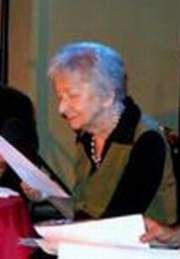|
Biography Wislawa Szymbroska
S-a n─âscut ├«n or─â╚Öelul Kornik din vestul Poloniei, la 2 iulie 1923. Urmeaz─â liceul la Cracovia, unde familia se stabile╚Öte ├«n 1931. Este abslovent─â a Facult─â╚Ťii de Filologie si Sociologie a Universit─â╚Ťii Jagellone din Cracovia(1948).
Debuteaz─â ├«n via╚Ťa literar─â ├«n martie 1945, cu poemul "Caut cuvintele", ap─ârut ├«n suplimentul literar al cotidianului "Dziennik Polski". ├Än 1925 i se tip─âre╚Öte prima carte de poezii - "Pentru ce tr─âim".
Publică numeroase alte volume, dintre care în limba română au apărut, selectiv, "Bucuria scrierii" - 1979, "Sub o singură stea" - 1999, "În râul lui Heraclit" - 2003, "Clipa" - 2003.
Semneaz─â volume de publicistic─â (eseuri-recenzii), traduce din poe╚Ťi francezi, sus╚Ťine conferin╚Ťe, redacteaz─â cronici de pres─â. Opera sa a fost tradus─â ├«n toate limbile de circula╚Ťie interna╚Ťional─â.
I se decerneaz─â Premiul Goethe - 1991, Premiul Herder - 1995, Premiul PEN-Clubului Polonez - 1996, Premiul Nobel - 1996.
Wislawa Szymborska was born in 1923 in Bnin, a small town in Western Poland. Her family moved to Krakow in 1931 where she has lived and worked ever since.
Szymborska studied Polish literature and sociology at Jagellonian University from 1945 until 1948. While attending the university, she became involved in KrakowÔÇÖs literary scene and first met and was influenced by Czeslaw Milosz. She began work at the literary review magazine Życie Literackie (Literary Life) in 1953, a job she held for nearly thirty years.
Szymborska is the author of more than fifteen books of poetry. Her collections available in English include Monologue of a Dog (Harcourt, 2005), Miracle Fair: Selected Poems of Wislawa Szymborska (Norton, 2001), Poems, New and Collected, 1957-1997 (Harcourt, 1998), View with a Grain of Sand: Selected Poems(Harcourt, 1995), People on a Bridge (Forest, 1990) and Sounds, Feelings Thoughts: Seventy Poems (Princeton UP, 1981). She is also the author of Nonrequired Reading (Harcourt, 2002), a collection of prose pieces.
While the Polish history from World War II through Stalinism clearly informs her poetry, Szymborska is also a deeply personal poet who explores the large truths that exist in ordinary, everyday things. "Of course, life crosses politics," Szymborska has said "but my poems are strictly not political. They are more about people and life."
In the introduction to Miracle Fair, Czeslaw Milosz wrote: "Hers is a very grim poetryÔÇŽa comparison with the despairing vision of Samuel Beckett and Philip Larkin suggests itself. Yet, in contrast to them Szymborska offers a world where one can breathe."
Writing in the New York Review of Books, Stanislaw Barańczak said: "Wit, wisdom and warmth are equally important ingredients in the mixture of qualities that makes her so unusual and every poem of hers so unforgettable."
In 1996, Szymborska won the Nobel Prize. Her other awards include the Polish Pen Club prize, an Honorary Doctorate from Adam Mickiewicz University, the Herder Prize and The Goethe Prize.
Selected Bibliography:
Sounds, Feelings, Thoughts: Seventy Poems (1981)
People on a Bridge: Poems (1990)
View with a Grain of Sand: Selected Poems (1995)
Nothing Twice: Selected Poems (1997)
Poems, New and Collected, 1957-1997 (1998)
Nic darowane = Nothing's a Gift (1999)
Miracle Fair: Selected Poems of Wislawa Szymborska (2001)
Nonrequired Reading: Prose Pieces (2002)
Chwila = Moment (2003)
Monologue of a Dog: New Poems (2005)
|





